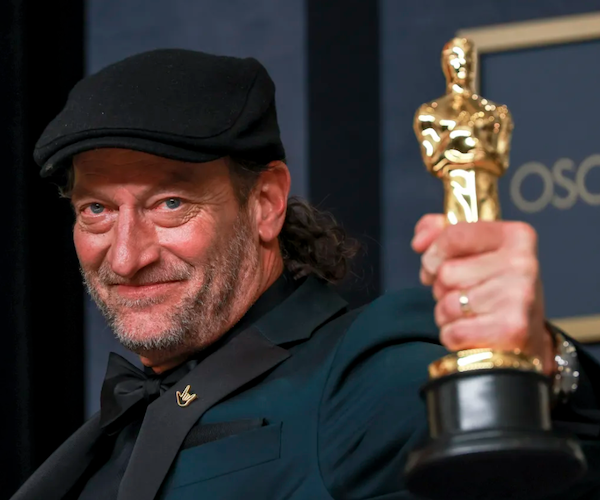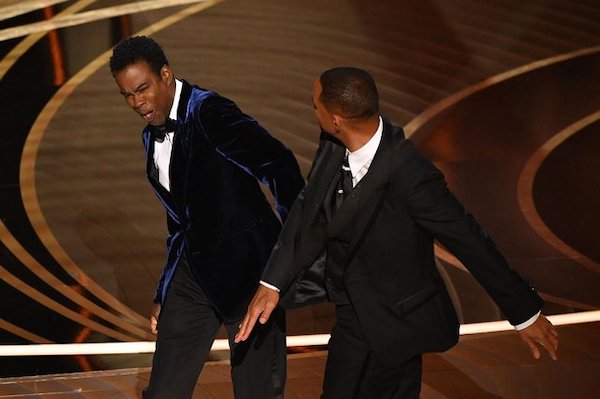Arts Commentary: The 2022 Academy Awards — “Timmy, Don’t Hit Your Sister”
By Tim Jackson
Aside from the multiple awards Dune won for technological brilliance, the 94th Academy Awards was a very different sort of “Hooray for Hollywood.”

Troy Kotsur holding up his Oscar for CODA.
“Timmy, don’t hit your sister”
“But she called me names”
“We don’t hit”
How many times has that conversation been had in homes across America? That came to mind when Will Smith clocked Chris Rock for a tactless joke about the bald head of Will’s wife, Jada Pinkett Smith, during the 2022 Oscar ceremony. It seemed unlikely that Rock could not know about her battles with alopecia, an autoimmune condition that results in hair loss. He gave his signature cackle after the comment, further inciting Pinkett-Smith to roll her eyes and hubby to leap to her defense, mount the stage, and assault Rock. This may be a valid action-movie response, but it is hardly what is expected to happen in front of an audience of millions. Reality TV invaded the glitz, glamour, and all-so-forced smiles of Hollywood’s big night. Not sure how you would describe it — “bitch slap,” “clock,” or “sucker-punch” — but you could hear the blow strike Rock’s face. Dazed, his comeback was, “That was the greatest moment in television history.” Where is Jerry Springer when we need him? It was Denzel Washington who, according to Smith in his tear-filled acceptance speech for Best Actor, whispered useful advice: “At your highest moment, be careful. That’s when the devil comes for you.”
Predictably, Twitter was aflutter: there were comic responses, legal questions, psychological scrutiny, and somewhere someone was assessing the likely boost to ratings. Kathy Griffin, who had her own issues with inappropriate comedy when she posed with the severed head of Donald Trump, tweeted: ”It’s a very bad practice to walk up on stage and physically assault a comedian. Now we all have to worry about who wants to be the next Will Smith in comedy clubs and theaters.”
I thought of Lisa Cholodenko’s cable series The Slap, based on Christos Tsiolkas’s 2008 novel. The story looks, from the varying perspectives of its protagonists, at what happens to those involved after a man strikes a child at a birthday party. Rock will not file charges but his upcoming response should be interesting. For his part, Smith handled it with amazing tact. In his speech following his predicted win for Best Actor in King Richard, he apologized to the Academy and to his fellow nominees — but not to Rock. He compared his violent reaction to the character of the man he played in the film, Richard Williams, the volatile father of Serena and Venus, who also “defended his family.” Williams, however, never assaulted anyone; in fact, he was the victim of a racist beating.

Will Smith (R) slaps Chris Rock onstage during the 94th Oscars at the Dolby Theatre in Hollywood.
From Brittany Spears to Robert Downey Jr. and Mel Gibson, Hollywood loves a good comeback. Smith managed it in 20 minutes. He tied the notion of honor and family to what he had done, and his tears received the affirmation of healthy applause. Director Judd Apatow tweeted: “He lost his mind.” During the ceremony, Sean Combs came back with, ”Will and Chris we’re gonna solve that like family at the Gold Party but right now we’re moving on with love.” Smith grinned and clapped his hands. Host Amy Schumer, who had earlier made an entrance hanging from cables in a Spiderman costume, returned to the stage with: “I was getting out of my Spiderman costume. Did I miss something?” Then, fist bumping Tiffany Haddish, she said “There’s a different vibe in here.”
Indeed, there was. The show began casually with some so-so jokes from the three female hosts, Regina Hall, Wanda Sykes, and Schumer. Though one of Schumer’s sharp comments should be given credit: “This year, the Academy hired three women to host because it’s cheaper than hiring one man.” This year Will Packer, a Black producer whose diverse resumé of films have brought in over a billion dollars, came up with a significantly more diverse show. There were many more presenters of color and a funkier feel to the proceedings, including a gospel choir for the In Memoriam section. Following “the slap,” and partly because the major acting awards were about to be presented, the evening took on a more serious tone. Afro-Latina gay performer Ariana DeBose had already won for Best Supporting Actress, a first. Nonhearing actor Troy Kotsur won Best Supporting Actor, delivering a heartfelt speech for his performance in CODA. The speech was delivered in ASL — music would not be interrupting the first nonhearing actor to win this award.
There was a moment of silence for Ukraine, with information listing a site for contributions. Jane Campion won as director for the closeted cowboy drama, The Power of the Dog. Best Actress winner for her role in The Eyes of Tammy Faye, Jessica Chastain made some serious points about suicide prevention, with a particular focus on trans people. Tammy Faye Baker was, for all her eccentricities, a champion for LGBTQ rights. A reasonably small budget film, CODA, won the Best Picture Award. (It was produced by the Apple Streaming service.) This was a first for a film that had received no nominations for directing or editing and featured a nonhearing cast. It was also the first Sundance Film Festival winner to grab an Oscar. A tip of the hat to old Hollywood came when Al Pacino, Robert De Niro, and Francis Ford Coppola took a bow to celebrate the 50th anniversary of the making of The Godfather. A confused and wheelchair-bound Liza Minnelli, gently aided by Lady Gaga, announced Best Picture. Aside from the multiple awards Dune won for technological brilliance, the 94th Academy Awards was a very different sort of “Hooray for Hollywood.”
Tim Jackson was an assistant professor of Digital Film and Video for 20 years. His music career in Boston began in the 1970s and includes some 20 groups, recordings, national and international tours, and contributions to film soundtracks. He studied theater and English as an undergraduate, and has also worked helter skelter as an actor and member of SAG and AFTRA since the 1980s. He has directed three feature documentaries: Chaos and Order: Making American Theater about the American Repertory Theater; Radical Jesters, which profiles the practices of 11 interventionist artists and agit-prop performance groups; When Things Go Wrong: The Robin Lane Story, and the short film The American Gurner. He is a member of the Boston Society of Film Critics. You can read more of his work on his blog.


I have to say that I like Denzel Washington, who I like a lot, least when he grows sententious, as in:
“At your highest moment, be careful. That’s when the devil comes for you.”